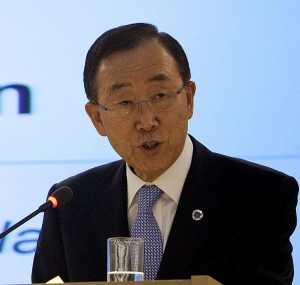UN, Australia, EU laud PH for ‘historical leap’ to end Mindanao conflict
The United Nations, Australia and the European Union on Tuesday hailed the Philippine government for taking a “historical leap” to ending decades-old conflict with secessionist rebels in Mindanao.
UN Secretary General Ban Ki-moon praised the preliminary peace accord between the Philippine government and the Moro Islamic Liberation Front (MILF) ending a protracted Muslim separatist insurgency that killed 150,000 people, offering UN aid “as needed.”
The agreement would see the establishment of a new autonomous region in resource-rich Mindanao, which the 12,000-strong MILF regards as its ancestral homeland.
Ban commended President Aquino for his “vision and courage, as well as the commitment of the MILF leadership, in reaching this landmark achievement,” according to a UN statement.
Ban said the United Nations was prepared to help the Philippines implement the agreement.
“The United Nations stands ready to provide assistance to the parties, as needed, in implementing the framework peace agreement,” Ban said.
Lasting peace
Speaking at the United Nations N-Peace (Engage for Peace, Equality, Access, Community and Empowerment) Awards at the New World Hotel Tuesday, President Benigno Aquino said a lasting peace could only be forged by engaging all sectors, and hoped that the framework agreement would seal a final peace accord with the MILF.
“In your own individual capacities, you have embodied the belief that a just and lasting peace can only be achieved when every sector takes part in the process of peace building and development—when no one is left behind, when the voices of all are heard and valued, when men and women alike are empowered to take part in nation-building,” Mr. Aquino said.
“This is the same spirit that has informed our most recent achievement on the path to peace—an achievement in which, I am proud to relate, Secretary [Teresita] Deles has played an important role,” he added, referring to his adviser on the peace process.
Deles was one of the N-Peace awardees. N-Peace awards are given to individuals for their leadership and contribution to building peace in Asia.
Role models
N-Peace is a network of tens of thousands of peace advocates who share skills and knowledge in promoting peace in their countries. It is facilitated by the United Nations Development Program (UNDP) in partnership with the Search for Common Ground, the Institute for Inclusive Security and with support from the Australian Agency for International Development (AusAID).
Mr. Aquino said building peace “is not easy,” but each N-Peace awardee has shown the way “to find our own ways of becoming role models for peace.”
“I believe that we can do this on a regional, and even global scale: That we must all take part in building a virtuous cycle among ourselves, where we provide not only role models, but mentors and companions to each other, driven by similar experiences and similar goals,” Mr. Aquino said.
“Even as we build peace in our own communities and nations, so too will we help to foster peace in the global community: A peace that will lead to the progress, prosperity, and stability of all nations and peoples,” he said.
Ready to support
Mindanao served as a base for the MILF, the biggest and most important secessionist rebel group, after the Moro National Liberation Front (MNLF) signed a peace pact with the government in 1996.
UN Resident Coordinator Luiza Carvalho congratulated President Aquino and the country for the imminent signing of the framework agreement for peace.
“This is a momentous time in the country’s history as the Filipinos make a historic leap toward ending a conflict that has spanned more than 40 years,” Carvalho said.
Carvalho, also the resident representative of the UNDP, said the UN family was “ready to support the Philippines as critical subsequent steps in the peace process are taken within the parameters of the framework agreement.”
Furthering partnership
Australian Ambassador to the Philippines Bill Tweddell also praised the Philippine government for forging the agreement with the MILF.
“How very appropriate that we’re holding this event in the Philippines only days after a historic framework agreement was reached between the Philippines and the Moro Islamic Liberation Front,” Tweddell said.
Tweddell said Australia has been a contributor to peace and security in Mindanao by supporting education, government reforms and community resilience, and “looked forward to furthering this partnership.”
Catherine Ashton, European Union representative for foreign affairs and security policy, called the agreement, which would be signed in Malacañang on Oct. 15, a “major step toward long-lasting peace in Mindanao.”
She said the agreement would lead Mindanao “to stability and prosperity.”
“The EU, as a member of the International Monitoring Team and major development partner in poverty alleviation in Mindanao since 1990, will continue to lend its full support,” she said.
Peace, prosperity
In the UN statement, Ban expressed “his heartfelt wishes for peace and prosperity to the government and the people of the Philippines,” and in particular the people in the new autonomous region, called Bangsamoro.
Mindanao is one of the most fertile and resource-rich parts in the archipelago—but decades of violence and unrest have left it into one of the poorest regions of the Philippines.
The secessionist war, which began in 1978, has left 150,000 people dead and displaced hundreds of thousands more. With reports from Tarra Quismundo and AFP
Originally posted: 8:59 pm | Tuesday, October 9th, 2012
